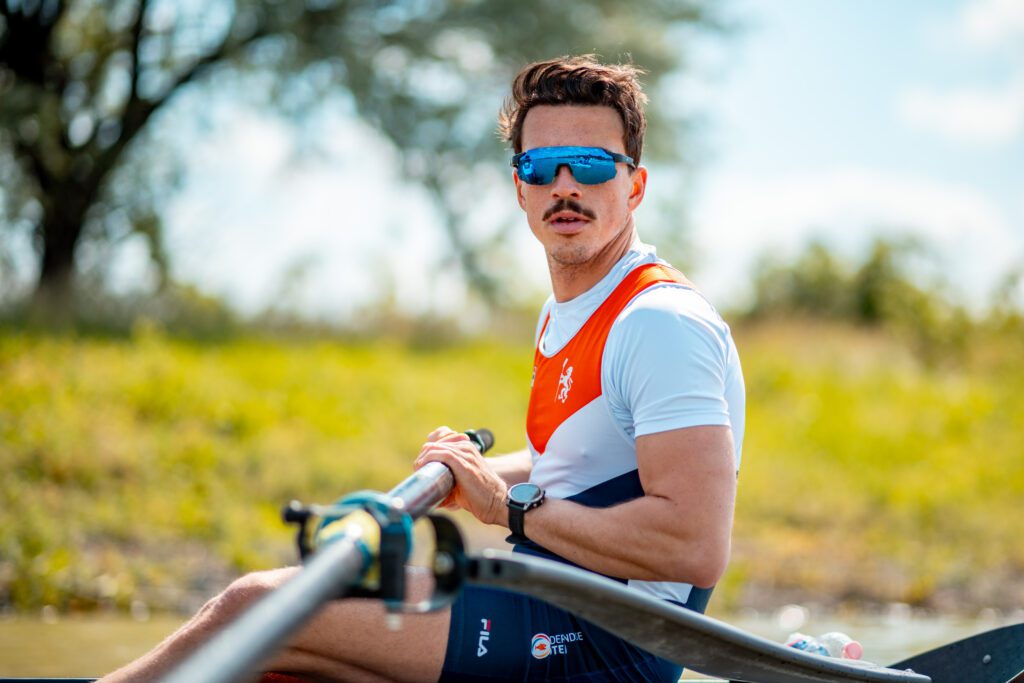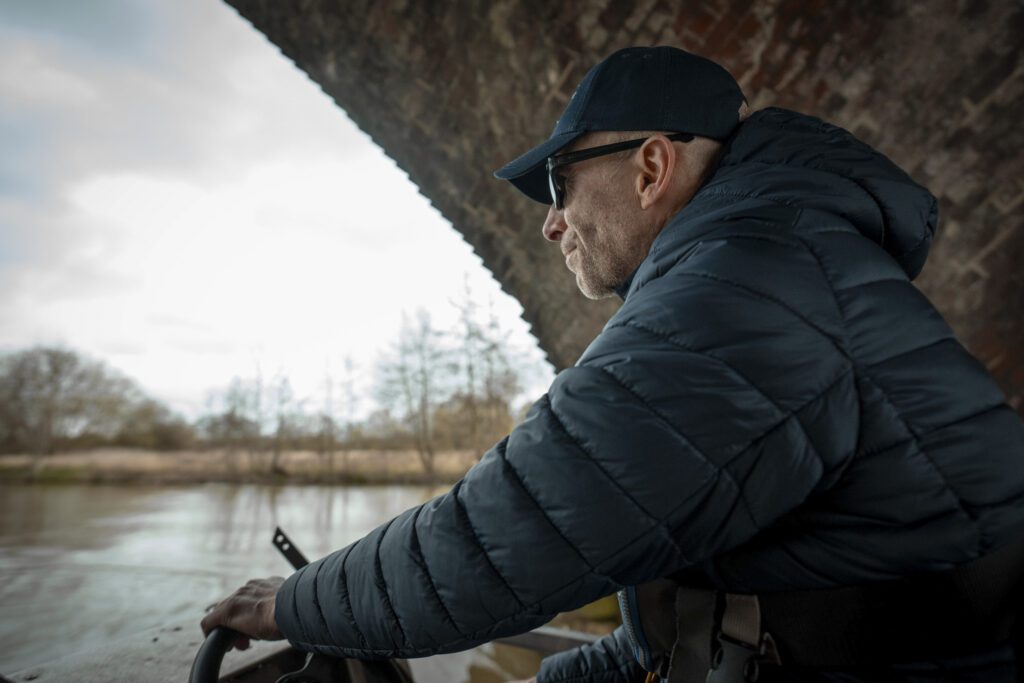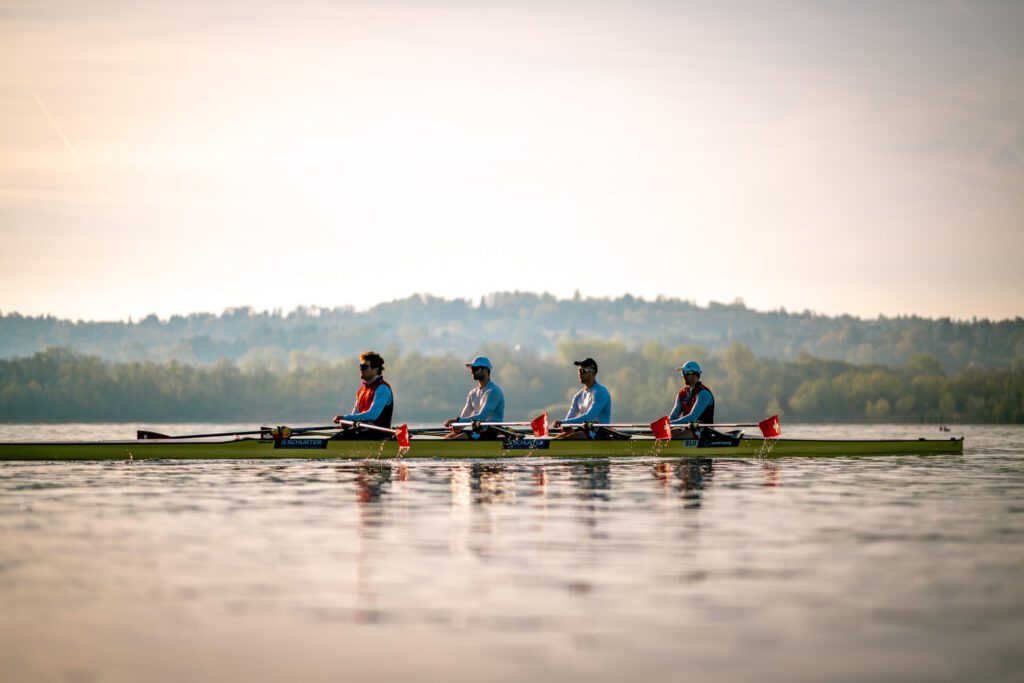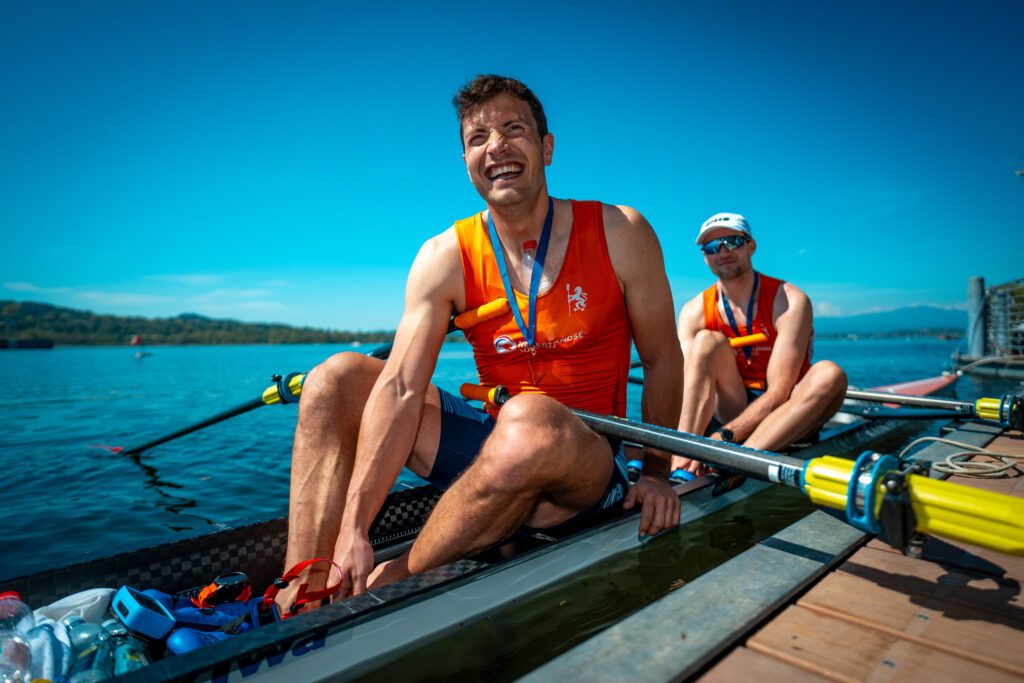Serbia plays host to the first regatta of the 2022 World Rowing Cup series. It is the first World Rowing Cup regatta since Tokyo 2020. The last post-Olympic world cup regatta was also held in Belgrade, in 2017. It is an intriguing blend of blooding-in young talent, and rusty-returners blowing off the cobwebs. Of the 435 athletes entered into 2022 World Rowing Cup I, there is a strong contingent of young up-and-comers. Only 26 months shy of Paris 2024, this regatta is the test event for the 2023 World Rowing Championships which is the first opportunity for Olympic qualification. In short, there’s plenty to play for.
Big Boats, Little Entries
There are only three crews in each of the men’s and women’s eights event. It will be China versus Netherlands in the women’s eights; the Dutch have one eight and Chinese are fielding two. Half of the Dutch women’s eight will also compete in the double sculls. Laila Youssifou, who raced in the quad at Tokyo, joins Olympic bronze medallist Roos de Jong in the double, while Veronique Meester and Ymkje Clevering, both Tokyo 2020 silver medallists from the women’s four, form the other Dutch double doubling up.
The men’s eights are; Great Britain, Netherlands, and China. The Dutch and the Chinese (perhaps) preempted the dearth of eights and are doubling up in the fours event. Rumours of sizzling-hot speeds from the new look Great Britain men’s eight align with their dominant performance in the internal speed order held at Caversham, UK. Tokyo 2020 bronze medal returners come by way of James Rudkin, Tom Ford, and Charlie Elwes. Oxford Brooke’s Harry Brightmore has been given the nod despite stiff competition from Olympic bronze medallist cox Henry Fieldman. Brightmore and his crew will surely aim for the top spot on the podium. “Getting back to gold medal delivery is very high on our agenda,” says Louise Kingsley, Great Britain’s Director of Performance, on her intention to lead British resurgence in this Olympiad.
“It would be epic to block out the podium.”
Tom George
Fours on the doors
China have two crews in both the men’s and women’s fours. Their women’s four features Xinyu Lin, who placed fifth in the four at Tokyo 2020, and Xiaoxin Liu from China’s Tokyo 2020 women’s double. The Spanish are fielding a young womne’s four led by the former European champion and two-time Olympian Aina Cid – whose Tokyo 2020 pair’s partner, Virginia Diaz Rivas, will compete in the women’s single sculls. Tokyo 2020 fourth place finishers Great Britian retain half of their Olympic line-up, Harriet Taylor and Karen Bennett are taking time out from international rowing, so Rowan McKellar and Rebecca Shorten are joined by Leander’s Heidi Long and Samantha Redrgave. Poland’s women’s four will likely feature towards the front of the field, they are 2021 European Rowing U23 Championship medallists; Lesner and Kaźmierczak in the four, and Duda and Jechorek in the quad.
If the Netherlands do not dominate the men’s fours event they have at least dominated the entries; four of the fourteen fours are Dutch. In addition to U23 and development athletes hoping to make their mark, are Dutch Olympians, Bjorn Van den Ende, Ruben Knab, Sander de Graaf and Nelson Ritsema. Van den Ende and Knab placed fifth in the Dutch men’s eight at Tokyo, and de Graaf and Ritsema finished sixth in the four. China’s lead four features Wenlei Lu, Xianfeng Chen, and Pengpeng Cai, who all missed Tokyo 2020 qualification for the men’s eight at the 2021 Final Olympic Qualification Regatta. There are no Olympians in Great Britain’s four, those who competed at Tokyo in this event are either racing in the eight (Sholto Carnegie and Rory Gibbs), pair (Matt Rossiter), or taking time out of the sport (Ollie Cook). All four of the British four are former U23 medallists and will be looking to prove themselves before the inevitable rounds of seat racing later in the summer. Poland’s crew has Olympic talent and world championship gold medal pedigree. India makes a welcome appearance with two men’s fours.
“Getting back to gold medal delivery is very high on our agenda.”
Louise Kingsley
No crew journey to the start line will be as uncertain and stress-laden as those of Ukraine’s, it is good to see their crews ready to race. “It was hard for us to train because we don’t know what will happen next with us, or our country. We are determined to fight for the victory of Ukraine in the sports arena,” says Rio 2016 Olympian Yevheniia Dovogodko who is set to compete in the women’s quad. She thanks the “many people” who have helped the Ukrainian team, including the Croatian rowing federation that helped transport their boats.
In the PR3 mixed fours there is a classic rivalry to be renewed between the British and Australians. Great Britain will be looking to continue their dominance despite welcoming two new faces to the defending Paralympic champion crew. Edward Fuller replaces retired two-time Paralympian James Fox, and Francesca Allen is in for Ellen Buttrick.
Pairing All
Internal selection played out in public; the men’s pairs event will settle some selection scores and is an opportunity to draw first blood after the Olympic, European and world champion Sinkovic brothers vacate the event. Switzerland, Lithuania, and Netherlands each enter two pairs, while Great Britain has a triplet of duos in the 20-strong field. “A big inter-squad battle,” says Olympic bronze medallist Tom George, who will race with Ollie Wynne-Griffith in GBR2. “But I really hope that all three pairs go well, it would be epic to block out the podium.” Great Britain’s three entries speak to the unfinished business of internal selection, but the rowers will also seek medal-success. Certainly, the Croatian Lončarić brothers will be looking to the podium, and so will the local Serbian favourites, Martin Mačković and Miloš Vasić. But the Serbian pair may need to be patient after Vasić’s recent recovery from a torn pectoral muscle; the Serbian pair could be a crew that builds through the 2022 season.
The Dutch have three crews racing in the women’s pairs. If Josipa’s recovery from hip surgery has not hampered their speed too much then Croatia’s U23 world champion Jurkovic sisters will be a formidable partnership. Emily Ford and Rebecca Edwards (travelling spare) are Great Britain’s sole survivors from the Tokyo 2020 women’s eight. Ford has teamed up with Esme Booth – who finished fourth in the women’s four at the 2021 World Cup III in Sabaudia.
“I love racing, and I am eager to kick off the season.”
Bendegúz Pétervári-Molnár.
Double Trouble
Joining the Dutch in their doubling up strategy are the British women who compete separately as two doubles and together in the quadruple scull. It will be well-earned return to international racing for Jess Leydon who last competed at the 2019 World Rowing Championships, but struggled to find form after succombing to Covid during the 2021 Olympic year. Evangelia Fragkou and Zoi Fitsiou compete for Greece. Fragkou will hope to continue her success from the 2021 season that saw her win four medals U23 and junior world and European championships. Fitsiou is a former lightweigh who also has experience as a coastal rower.
In terms of potential Paris 2024 match-ups the men’s doubles event in Serbia might provide a sneak preview but even without the prospect of Paris, these Olympic class crews will make for punchy contests. The two-time Olympic champion Sinkovic brothers, fresh from their five-year sweep holiday, will be looking to reclaim their sculling throne but the Dutch double may have another narrative lined-up. Tokyo 2020 Dutch men’s quad Olympic champion Koen Metsemakers teams up with Tokyo 2020 Olympic silver medallist Stefan Broenink. Poland’s pairing of Fabain Baranski, who came fourth at Tokyo in the quad, with Tokyo 2020 men’s double A-finalist Miroslaw Zietarski will also be fighting for a podium finish from among the twenty-two entries.
It is between Mexico and Australia for the PR2 mixed double scull. Australia’s Kathryn Ross is on double duties as she will also race Great Britain’s Tokyo 2020 Paralympic champion Lauren Rowles in the PR2 women’s single sculls. There are six entries in the PR2 men’s single sculls including Tokyo 2020 Paralympic silver medallist Erik Horrie and Mexico’s Michel Munoz Malagon. Great Britain has sent two single scullers Tokyo 2020 Paralympic Ben Pritchard and newcomer Callum Russell.
Solo Endeavours
Of all 30 men’s single scullers at this world cup surely Germany’s Oliver Zeidler will be the most eager to get the new Olympiad underway. It has been a long wait for Zeidler to begin righting the wrongs of the last Olympic cycle. A shocking Toyko 2020 semifinal saw the 2019 world champion and highly-heralded favourite miss the A-final and a shot at Olympic glory. The former Greek lightweight who dealt this blow and went on to secure Olympic gold, Stefanos Ntouskos, is also one of the 30-single scullers competing in Belgrade. Bulgaria have sent four scullers, including the U23 gold medallist Emil Neykov. Two-time Polish Olympian Mateusz Biskip tries his hand at the single scull. Similarly, Great Britain’s Tokyo 2020 double of John Collins and Graeme Thomas shall line-up against each other, and they are joined by a third Brit, Callum Dixon, the U23 European champion and former sailer. Multiple GB Trials winner Thomas will be eyeing a podium finish. While Bendegúz Pétervári-Molnár, the two-time Hungarian Olympian single sculler, is hoping to make it into the A-Final. “I love racing, and I am eager to kick off the season,” says Pétervári-Molnár.
“We are determined to fight for the victory of Ukraine in the sports arena.”
Yevheniia Dovogodko
There are 24 women’s single scullers, including four entries from China and Yi-Ting Huang the Tokyo 2020 Chinese Taipei single sculler. China’s Olympic champion Yunxia Chen endeavours to find success in the single after her golden spell in the quad, and Olympic bronze medallist Zifeng Wang makes the mighty leap from China’s Tokyo 2020 women’s eight. On the return to games list is Tokyo 2020 Olympic bronze medallist Magdalena Lobnig who overcame a painful foot injury last autumn. Olympic bronze medallist Lisa Scheenaard switches the Tokyo 2020 Dutch double for the single at this world cup, and races her fellow countrywomen Karolien Florijn who moves from the Tokyo 2020 Olympic silver-medal-winning Dutch women’s four. Czech athlete Lenka Antosova is another sculler more used to the double who will race in the single and likewise three-time Lithuanian Olympian Donata Karalienė is venturing solo at Belgrade (a throwback to her London 2012 Olympic campaign). Like all Russian and Belarusian athletes, Olympic silver medallist Hanna Prakatsen will be absent from the regatta following World Rowing’s ban that aligns with the International Olympic Committee’s recommendations.



